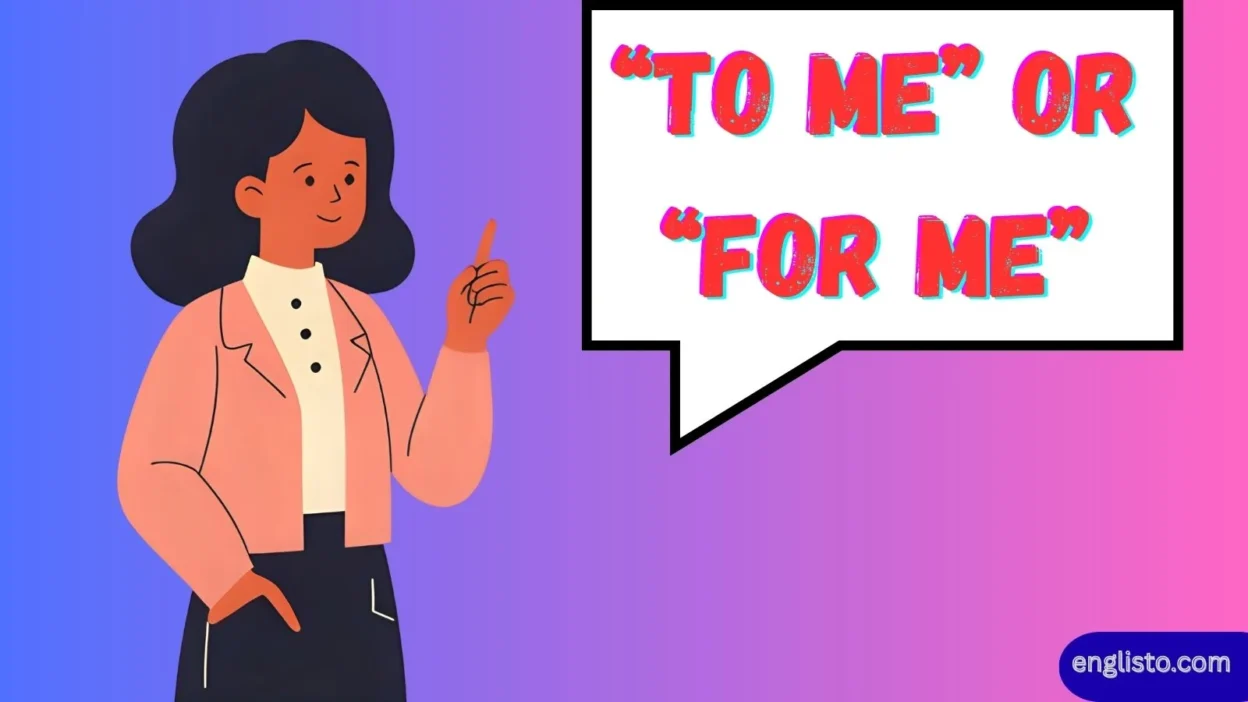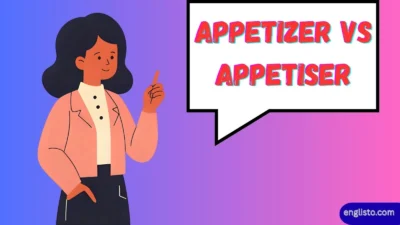Language can be a tricky puzzle. Even tiny prepositions like “to” and “for” can change the meaning of a sentence in subtle but important ways. English learners (and sometimes even native speakers) often pause mid-sentence, unsure whether to say “to me” or “for me.”
At first glance, both phrases look similar. They’re short, interchangeable in certain contexts, and often used in everyday conversation. But when you dig deeper, you’ll see they carry different shades of meaning, different emotional tones, and sometimes even different grammar rules.
This guide explores the difference between “to me” and “for me” in a clear, natural way. We’ll look at grammar explanations, real-life examples, idiomatic uses, synonym tables, and cultural nuances so you can confidently choose the right phrase in any situation.
What Does “To Me” Mean?
The phrase “to me” usually refers to direction, communication, or expressing an opinion. It connects the action toward the speaker.
- Direction / Movement:
- She gave the book to me. (The book moved in my direction.)
- She gave the book to me. (The book moved in my direction.)
- Communication / Expression:
- He explained the problem to me. (I was the listener or recipient of the explanation.)
- He explained the problem to me. (I was the listener or recipient of the explanation.)
- Opinion / Perspective:
- It seems strange to me. (From my personal viewpoint, it feels strange.)
- It seems strange to me. (From my personal viewpoint, it feels strange.)
👉 In short, “to me” tends to highlight movement, transfer, or subjective opinion.
Read More: Resilience vs Resiliency: What’s the Difference and Why It Matters
What Does “For Me” Mean?
The phrase “for me” usually refers to benefit, favor, or suitability. It indicates that something is done on behalf of the speaker or is beneficial to them.
- Benefit / Favor:
- She carried the bags for me. (She helped me by carrying the bags.)
- She carried the bags for me. (She helped me by carrying the bags.)
- Suitability / Preference:
- This color doesn’t work for me. (It doesn’t suit my taste.)
- This color doesn’t work for me. (It doesn’t suit my taste.)
- Emotional Impact:
- That movie was really sad for me. (It affected me emotionally.)
- That movie was really sad for me. (It affected me emotionally.)
👉 In short, “for me” tends to emphasize purpose, benefit, or personal impact.
Side-by-Side Comparison
Here’s a table that breaks down the difference clearly:
| Usage Type | “To Me” Example | “For Me” Example | Key Difference |
| Direction | Give the phone to me | ❌ Not natural here | Refers to physical movement toward someone |
| Communication | Explain the rules to me | ❌ Rarely used this way | One person speaks directly to another |
| Opinion | It looks difficult to me | It looks difficult for me | “To me” = personal opinion; “For me” = personal challenge |
| Benefit / Favor | ❌ Not typical | He opened the door for me | Someone helps or acts on your behalf |
| Suitability | It doesn’t seem right to me | This option doesn’t work for me | “To me” = personal viewpoint; “For me” = personal preference |
| Emotional Impact | That sounds rude to me | That breakup was hard for me | “To me” = perception; “For me” = effect/impact |
How Native Speakers Actually Use Them
Sometimes, learners ask: “Can I use them interchangeably?” The answer: sometimes yes, but not always.
Take this pair:
- This book looks boring to me. (My opinion about the book.)
- This book is boring for me. (The book affects me in a boring way—it’s hard for me to enjoy.)
Both are correct, but they’re not identical in meaning.
Real-Life Usage Examples
Here are some everyday situations that show the subtle differences:
- Workplace Example:
- The supervisor explained the policy to me → Information was directed at me.
- The supervisor filled out the form for me → He did me a favor, saving me time.
- The supervisor explained the policy to me → Information was directed at me.
- Relationships:
- It seems important to me → This is my personal opinion.
- It’s important for me → This is something essential in my life.
- It seems important to me → This is my personal opinion.
- Travel:
- Traveling alone is scary to me → From my perspective, it feels scary.
- Traveling alone is scary for me → Personally, I struggle with it (maybe for financial or emotional reasons).
- Traveling alone is scary to me → From my perspective, it feels scary.
Grammar Deep Dive: Why “To” vs. “For”?
The prepositions “to” and “for” carry different core meanings:
- “To” → movement toward something, expressing direction or target.
- “For” → action on behalf of someone, expressing benefit or purpose.
Think of it this way:
- To = target
- For = benefit
This little rule solves 90% of confusion.
Synonyms and Alternatives
Sometimes, you can swap “to me” or “for me” with synonyms or rephrased versions.
| Phrase | Possible Alternatives | Example |
| “To me” | in my opinion, from my perspective, as I see it | To me, this plan works best → In my opinion, this plan works best. |
| “For me” | on my behalf, suits me, in my favor, beneficial to me | She made dinner for me → She made dinner on my behalf. |
Idiomatic Expressions Using “To Me” and “For Me”
- “It seems to me…” → A polite way of expressing personal opinion.
- “Do me a favor” → A set phrase always with for (not to).
- “That looks good to me.” → Means “I approve.”
- “That works for me.” → Means “That suits my schedule/preferences.”
Notice how idioms fix the choice automatically—native speakers don’t even think twice.
Common Mistakes and How to Avoid Them
- ❌ He explained the rules for me.
- ✅ Correct: He explained the rules to me.
- Why? Because “explaining” is communication directed at a listener.
- ✅ Correct: He explained the rules to me.
- ❌ She carried the box to me.
- ✅ Correct: She carried the box for me.
- Why? Because she did a favor by carrying it, not by moving it toward me.
- ✅ Correct: She carried the box for me.
- ❌ This seems easy for me. (when you mean “in my opinion”)
- ✅ Correct: This seems easy to me.
- ✅ Correct: This seems easy to me.
Cultural Nuances and Style
- Formal Writing: “To me” often sounds more objective (suitable for essays, academic contexts).
- Casual Conversations: “For me” is more personal, emotional, and often used when talking about preferences.
- Regional Variation: American English leans slightly toward “for me” in casual speech, while British English tends to use “to me” for opinions.
Practical Tips to Decide Quickly
- If you’re talking about opinions or communication → use “to me.”
- If you’re talking about benefits, favors, or suitability → use “for me.”
- If both fit, ask yourself: Am I the listener/receiver (to me) or the beneficiary (for me)?
Quick Reference Table
| Situation | Correct Choice | Example Sentence |
| Expressing opinion | to me | It looks strange to me. |
| Receiving communication | to me | She said hello to me. |
| Someone doing a favor | for me | He bought lunch for me. |
| Talking about suitability | for me | That job isn’t right for me. |
| Expressing effect/impact | for me | That breakup was hard for me. |
FAQs
Q1: Can “to me” and “for me” be used interchangeably?
Sometimes, yes. But usually, “to me” is about opinions or communication, while “for me” is about benefit or effect.
Q2: Which is correct—“That sounds good to me” or “That sounds good for me”?
Both can be correct:
- To me = I approve.
- For me = It suits my needs.
Q3: Why is “Explain it to me” correct, not “Explain it for me”?
Because explaining is about communication directed at a person. “For me” would mean you want someone else to explain it on your behalf to a third party.
Q4: Can I say, “It’s important to me” and “It’s important for me”?
Yes, but the meaning shifts:
- To me = I personally care about it.
- For me = It benefits me or is necessary in my life.
Q5: How do I know which preposition to use in writing?
Ask yourself: Is it about my opinion/communication (to me) or about a benefit/suitability (for me)? That rule works in most cases.
Conclusion
The difference between “to me” and “for me” may seem small, but it can change the whole meaning of a sentence.
- “To me” highlights direction, transfer, or opinion.
- “For me” emphasizes benefit, suitability, or emotional impact.
By learning these distinctions—and practicing with real-life examples—you’ll not only avoid common mistakes but also sound more natural and confident in English.
When in doubt, remember:
👉 To me = opinion or direction.
👉 For me = benefit or effect.
Mastering this tiny detail is a big step toward fluency.



